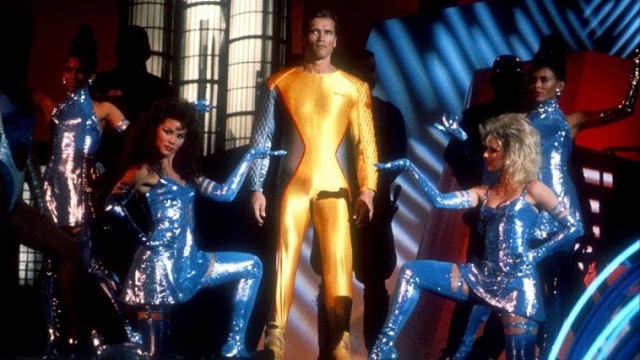The Running Man and The Lawnmower Man are the two Stephen King movies that are totally not Stephen King movies. The Lawnmower Man is the more notorious of the two: it took a very short story about a creepy sexualized pagan lawn mowing service and turned it into a movie about the internet and cyberspace. The Running Man played things a little more cautious, taking the themes of Stephen King’s novel and turning them into a completely different movie. Both version of The Running Man are incredibly prescient.
In the movie, The Running Man is a game show where criminals are put into arenas to fight and be slaughtered by an army of WWF-style wrestlers. Arnold Schwarzenegger stars as Ben Richards, a police officer imprisoned because he refused to fire on an unarmed crowd of protesters looking for food. The protesters were killed, and the massacre pinned on Richards. After escaping from prison, Richards is able to negotiate his way onto the TV Show The Running Man, where he’s running for his freedom.
In the novel, The Running Man is a television game show where the contestants are dispersed into the real world to be hunted down and slaughtered by the network. Ben Richards is an impoverished family man with a sick daughter and a wife prostituting herself for money. In a last ditch attempt for cash, Richards goes on The Running Man where his family will receive $100/hour for every hour he remains alive, and $1b if he stays alive for 30 days. In turn, fans of the show receive $3800 for information that leads to the hunters finding him again.
The movie version predicted the American fascination of Cops (1989) and America’s Most Wanted (1988), where everyday audiences were thrilled by seeing “criminals” being arrested, harassed, and tracked down. It resembled WWF and also predated American Gladiators (1989), nevertheless all of the copycats that followed. But, King’s novel now seems to have predicted the ways that mobile technology and the internet have turned the real world into Augmented Reality games. Fans of The Amazing Race are able to track down contestants and make a metagame during the filming trying to figure out where the next stops are. The book and movie The Circle both imagine people using the crowdsourced internet to track down people within 20 minutes.
Despite the differences of the versions, the heart of both the movie and the novel are the use of fake news and propaganda to manipulate an audience. The movie uses altered footage to turn Ben Richards into a demon before they send him into the tunnels. But, the novel takes it further. The novel has Richards having to record 2 daily statements for the networks to play to further stoke the audience into a frothing fury. Instead of playing the videos straight, the network doctors photos, alters recordings and constantly criminalizes Richards in a propagandic manner.
While the endings differ, both movies speak to fighting the mass media tooth and nail even as the rest of the public seems to be caught up in the madness. The novel forces the reader into Ben Richards’ point of view and keeps the proceedings as dirty and neo-realist as possible. The movie, however, puts the viewer in the seat of both the audience and the contestant. With flashing neon, bright colors, poppy music and editing, The Running Man film entices you to root for the game show and against Ben Richards and the prison friends he runs with. I mean, one of the enemies is a fat opera-singing controller of electricity named Dynamo who is adorned with Christmas Tree Lights and EL wire. He shoots bolts out of his hands. How can you not be rooting for him?
Though the film is obviously a low budget B-movie product of its time (some of the sets are hilariously chintzy), the dystopiam plot and accurate predictions towards future media keep The Running Man elevated above other films of its era. While the movie stars an appropriately stilted Schwarzenegger, it’s Richard Dawson as The Running Man‘s over-the-top host that walks away with the movie. Dawson is such a delightful villain, he almost entices you into rooting for the network. That tension between loyalties makes this an entertaining and satisfying satire.

